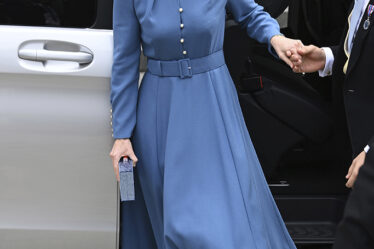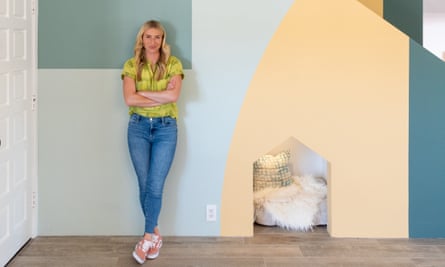
In 2021, Johnathan Lower, then a real estate agent in South Carolina, posted some old photos on TikTok that showed how he had turned a closet into a miniature home for his golden retriever, Teddy. The post racked up millions of views and Lower set out to build an even more elaborate indoor dog house for Teddy, this one including lights, wall decor, a miniature television, a faux fireplace and a tiny magazine called “Playdog”. (“I just did it because I’m extra,” Lower said.)
The popularity of Teddy’s custom doghouse helped Lower build an 11 million-follower social media empire under the name AGuyandaGolden, and led to partnerships with brands like Petsmart, Subaru and Hilton. Lower, 31, is now a full-time content creator.
On TikTok, other creators are showcasing their own dog nooks under the hashtag #dogcondos. Lower said he had recently seen home construction companies and personal contractors offering under-stair dog houses.
Welcome to the world of “barkitecture”, as Pinterest dubbed the growing “animal-first architecture” trend in 2021. Fueled by social media images, magazine spreads and home renovation TV shows, Americans are investing serious resources into home design for pets.
Some families are incorporating custom-built showers just for dogs into entrances and laundry rooms, so that muddy pups don’t have to be rinsed off outside or in a human shower. There are electronic pet doors that open only for the chip on a specific pet’s collar; custom kennels built to blend into a room’s decor and pet feeding stations that come with water faucets, so owners don’t have to fill a pet’s bowl in the kitchen sink.
“I’m always looking for ways to incorporate pet products in a home that feels really refined and sophisticated, and like it’s supposed to be part of the house,” said Jasmine Roth, the host of the HGTV renovation show, Help! I Wrecked My House.
Roth has designed a custom nightstand that doubles as a dog crate, and, in the empty spaces under flights of stairs, luxury “dog caves” or carefully concealed hiding spots for cats’ litter boxes. For litter box nooks, Roth said, she’ll build a tiny cat-sized door on one side, and a normal human-sized door on the other, for easy cleaning.
The pet architecture trend isn’t just for influencers. When the retiree Frankie Hebert renovated her California home in 2018, she was thinking about what she would need to make the house safe for herself as she got older – and also about what the design could offer her new dog, Molly.
Inspired by Pinterest, Hebert asked her interior designer to build a dog “feeding station” into her kitchen island. The result was a special alcove for Molly’s food and water bowls, so Hebert wouldn’t risk kicking over the bowls on the kitchen floor.
The feeding station is topped with the same stone used for the kitchen counters, with custom holes cut in it based on the precise size of Molly’s bowls. Later, Hebert added a dedicated LED light.
“Everyone who comes over – it’s the first thing they notice,” she said.
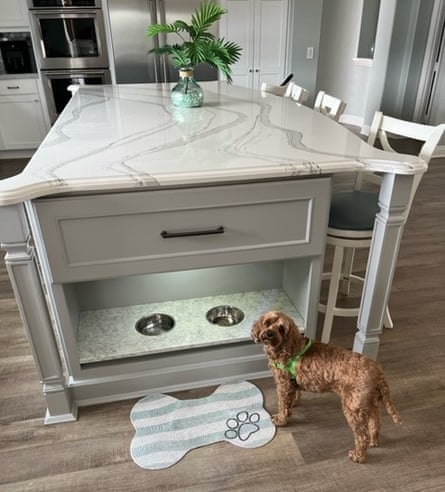
While some “barkitecture” elements have been in use for at least a decade, the trend saw a “big boom” during the pandemic, said Jennifer Pinto, an interior designer for Jackson Design and Remodeling, who worked with Hebert to design her feeding station.
“People were nesting at home and really viewing their spaces more as sanctuaries,” Pinto said. “A lot of people started hyper-focusing on their pets.”
In 2022, Americans spent an estimated $137bn buying things for their pets – a more than 10% increase compared to the year before, according to the American Pet Products Association, an industry group. More than half of US pet owners now consider pets to be “as much a part of their family as a human member”, according to a Pew survey conducted this spring.
Beneath the pet architecture trend, Lower, the dog influencer, said he sees a more profound social change: a decrease in the share of households with children and a continued rise in pet ownership. Particularly among younger Americans, Lower said, more people may feel that they can afford a pet than that they can afford having kids.
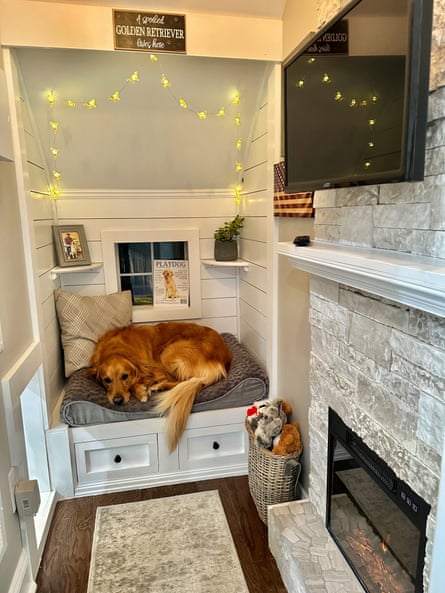
Even so, high-end pet renovations are far from accessible. An electronic pet door starts at about $500, Pinto said. A dog washing station might start at around $2,000, Davis estimated. Lower said that having a contractor build a “basic bare bones” dog house might cost $3,000 to $4,000, while a dog condo like Teddy’s might cost $7,000 to $10,000.
These builds are likely out of reach for the majority of pet owners. For Americans who are renters, having a pet can make it more difficult to find housing at all – and landlords who permit pets in their buildings may charge a monthly “pet rent” that can add up to hundreds of dollars in annual fees. Those fees are not distributed equally: a 2021 study found that low-income communities and communities of color were more likely to pay disproportionately high fees in order to keep pets in their homes.
But for Americans who own their own homes and can afford to customize them, barkitecture can blend the daily needs of household pets with high-end decor.
“There’s more and more people asking for these things as they’ve started to become more mainstream,” said Mike Tartamella, an architect with Patrick Ahearn, a Massachusetts-based firm that touts its expertise in dog-focused design.
Some of the additions can be truly elite: Tartamella said his company has worked on “fully integrated dog washing stations at the level of a high-end spa”, as well as a drinking water fountain for one homeowner’s dogs that had a tiled mosaic backing. “It looks like it could be in a church somewhere in Italy,” he said.
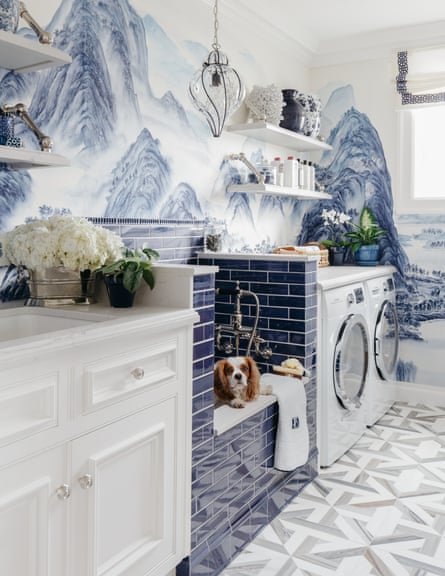
On Instagram, one of the most popular barkitecture images is a luxurious 2016 “washing station” design from Dina Bandman Goldstone, with a raised, dog-sized bath tiled in blue, and matching de Gournay wallpaper. The room was part of a design showcase in San Francisco, and Bandman Goldstone photographed it with a series of 30 different breeds of dogs, including a shih tzu and two French bulldogs.
Leslie Davis, an interior designer in Georgia, said that she was inspired by that image – and by the idea that a dog bathing area “can be beautiful”, she said. “It doesn’t have to be a stainless steel bin.”
She designed a raised, tiled bathing area for her Irish doodle, Freddie, in 2020, as part of a laundry room remodel. Freddie “doesn’t love a bath. He tolerates it,” she noted. “I line treats up on the little shelf on the side. He will refuse to eat them until it’s almost done.”
Cat lovers have their own interior design trends, from “catios”, or cat-safe outdoor patios, to systems of floating shelves for them to play on. One of Pinto’s clients in California asked to include a special shelf for their cat in their modest kitchen renovation, so the cat would be able to clamber around the entire room.
“I haven’t been asked to do anything for reptiles or ferrets or a more exotic-type animal,” Tartamella, the Massachusetts-based architect, said. “I don’t suppose there’s anything we could do for fish – we could do integrated aquariums.”
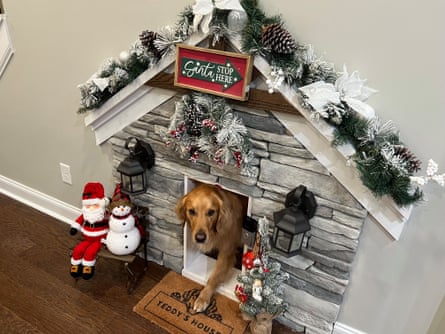
Lower said his golden retriever, Teddy, is so used to filming in his dog house that whenever Lower brings out a camera tripod, Teddy will immediately go inside. But Teddy also likes hanging out in the small space, which has both soundproofing and air conditioning. “He feels safe in the house when there are loud noises outside – thunder, fireworks,” Lower said.
While the dog-sized television is mostly decorative, Lower said, he will sometimes leave it on for Teddy if he’s alone, “just to have some background sound”.
Not all barkitecture trends may be appropriate for all homes, Roth, the HGTV host, cautioned. Homeowners with children should not install custom water taps, or “pot fillers”, right above their pets’ bowls.
“If you have kids, it’s right at the kids’ height, and kids will turn it on accidentally and it’s going to flood the whole kitchen,” she said.
“At the end of the day, the pets don’t really care,” she said. “It’s more for us, right?”

